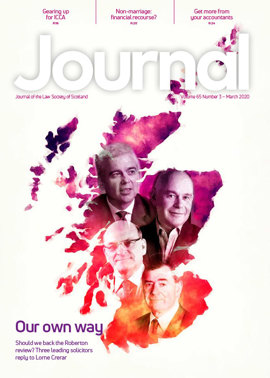President's column
Welcome to March’s Journal. I am not usually given to flights of philosophical, legal fancy, but this month I thought I would offer a reflection rather than a nuts and bolts column about the work of the Society.
When I became President, a good friend at my local faculty very generously gave me a book called Justice: What’s the Right Thing to Do? It is written by the Professor of Government at Harvard University, Michael J Sandel. You may remember he presented the completely compelling The Reith Lectures on the BBC. It’s only a 265-page paperback, but is well worth the read. I hope you have the time to give it a go.
I am sure that my friend is not clairvoyant. He could not have looked nine months into the future to see how useful his gift would be when, as part of Justice Week, I was asked to write a piece in The Scotsman about what justice means to me. From a Scottish criminal defence solicitor’s point of view it was very tempting just to say, in a nutshell, justice is when an independent, impartial decision-maker, after thorough and careful consideration of the evidence and the law, finds a charge against an accused person proven or not proven. I like to see the latter more often than the former, obviously.
However so, it took me a very long time to come up with anything which I thought made any real sense. It should not have been any surprise because, despite the fact that it is so fundamental a concept to the way we live, justice is such a hard concept to define. It is very difficult to pinpoint exactly what it is, but it certainly becomes clearer to us when we feel that we are not getting it.
I stressed the importance of access to justice in the sense of access to a system which tries, as far as is possible, to allow every person to be able to have unrestricted access to an established, consistent and predictable system of resolving disputes. I did not specifically mention legal aid, which perhaps understandably drew criticism from some quarters. If justice is a distant ivory tower and you can’t afford the entry fee, it is no more than something nice to look at. Legal aid is a cornerstone of access to justice and your Society continues to work tirelessly to secure proper rates of remuneration for our members who provide legal services with the benefit of legal aid.
Our members who work in the transactional, financial or not-contentious disciplines rely on a well developed system of justice as much as anyone else. It is just as important for that type of work to be done that there is a fair, stable system that guarantees business can be transacted with clarity and certainty. The financial health of our economy is central to justice, because we have seen only too clearly which budgets are cut most quickly and most deeply in times of financial uncertainty.
However, justice is and must be available to more than just individuals. I had the pleasure of meeting one of our members recently who works for an organisation called ClientEarth. It was the most interesting discussion. ClientEarth is an environmental law charity. They take governments to court, litigate to force polluting industries to shut down and protect irreplaceable habitats and vulnerable species. The environmental health of the planet is a global concern. The type of justice they are seeking is as important as any other.
It would be great if we could find a principle or procedure that could justify, once and for all, whatever distribution of power or opportunity resulted from it, but that is of course impossible.
I hope I did not choose the path of least resistance by suggesting justice will not be perfect until we are perfect. In the meantime we have to continue to find the best way of not only finding the right way to distribute things, but finding the right way to value things. We all depend on it.
Anyway, once you get to Friday afternoon and you don’t immediately collapse in a heap, after you have finalised all your transactions, finished all your trials, settled hundreds of your conveyancing transactions, filled in your timesheets and fully met your fee targets, I hope you get a chance to think about what justice means to you. See you next month, when normal column service will be resumed.







